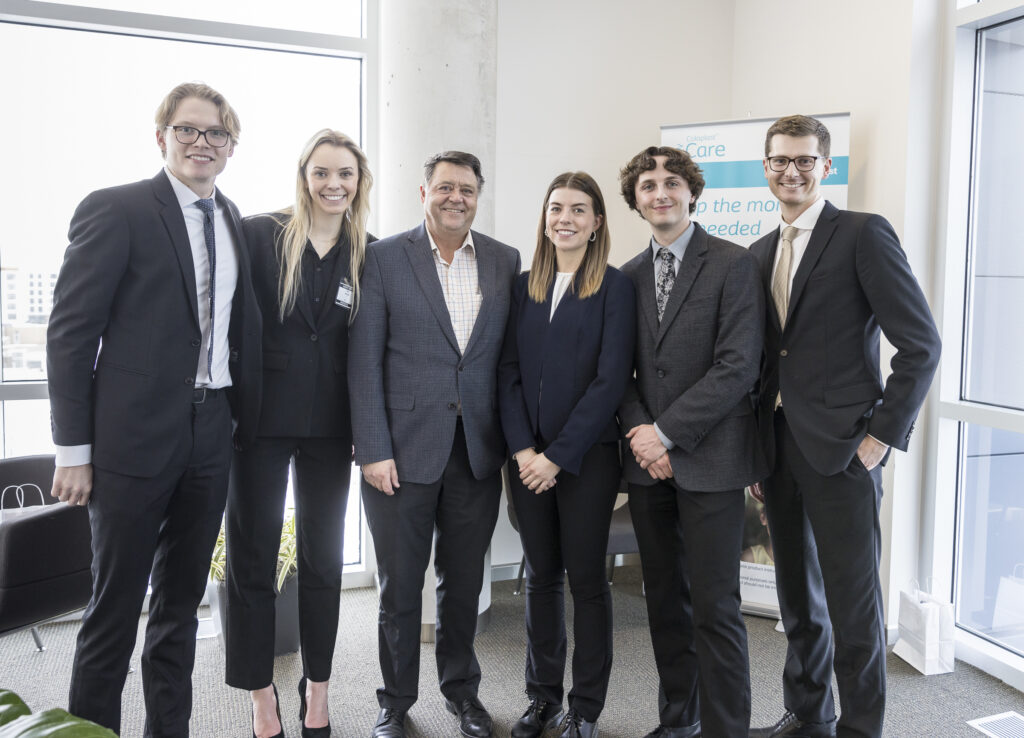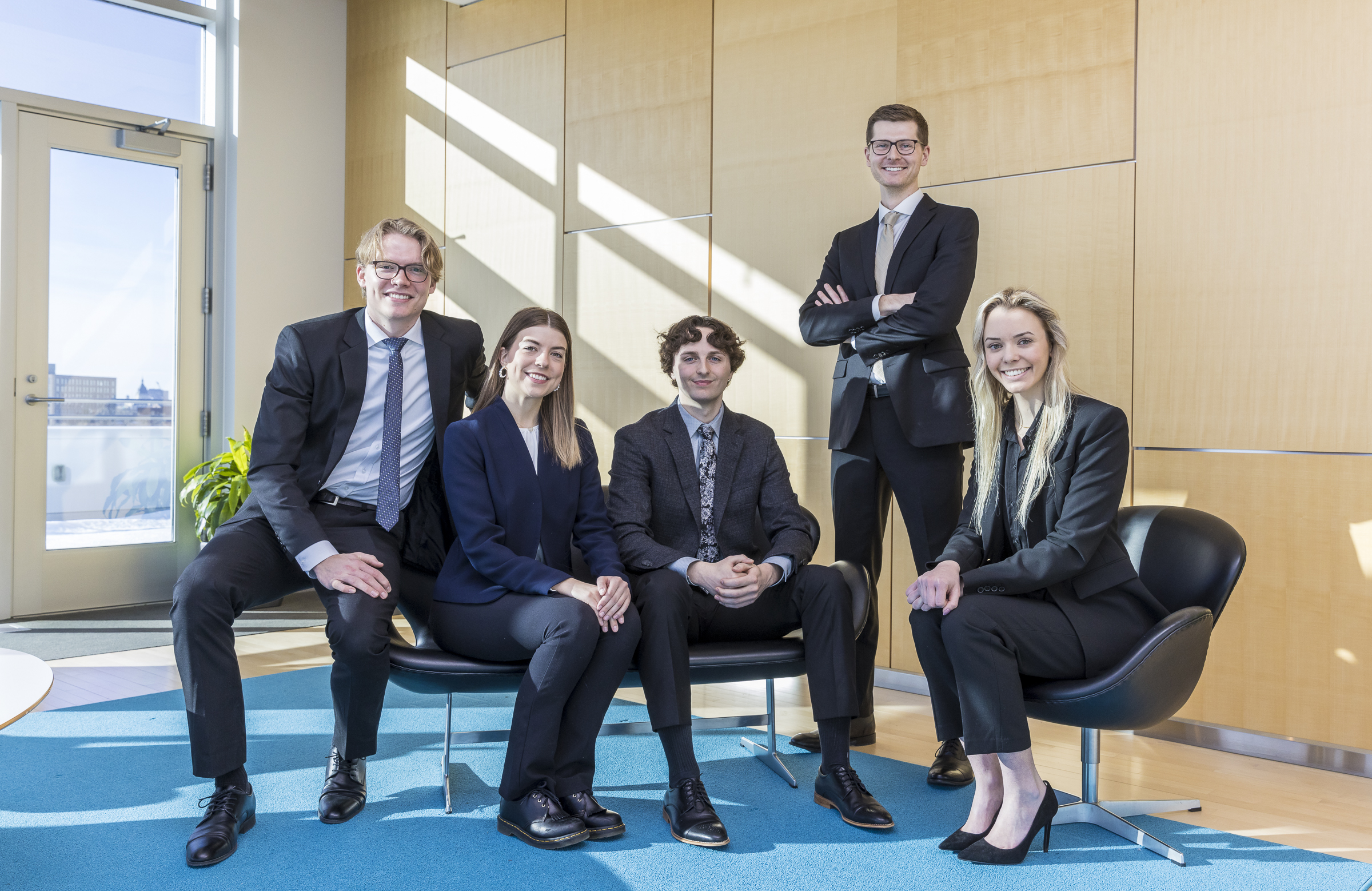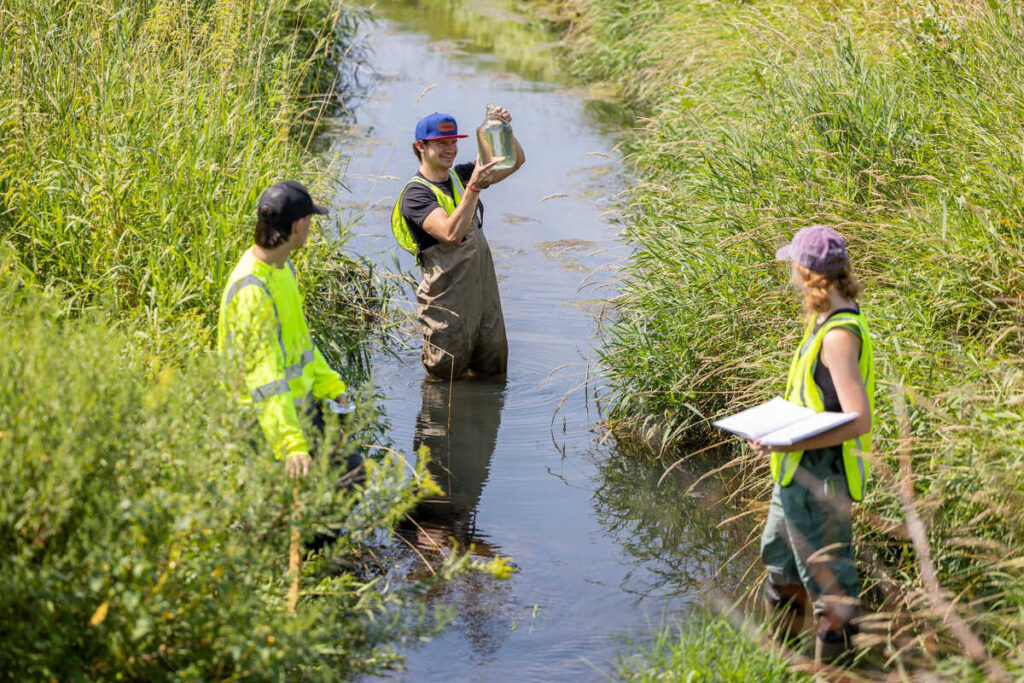When Jack Cunningham was looking at his MBA program acceptance letters in 2021, the University of St. Thomas alumnus wondered which school would give him the best runway for success.
St. Thomas stood out amongst the rest, but not just because it was his alma mater.
“I knew at St. Thomas I would be able to find opportunities to learn through doing,” said Cunningham, who received his bachelor’s degree in entrepreneurship in 2018.
His decision to pursue his MBA at St. Thomas was influenced by his passion for meaningful learning opportunities that would set him apart in the workforce and in life.
“I have found over the years that my most meaningful learning opportunities have come from those that are experiential,” he said.
Cunningham, now an MBA student at St. Thomas, led a team of four St. Thomas undergraduate students. The group collaborated with a young Medical Alley affiliate company, Newronika.
“If you would have told me that I would be working to understand the minuscule competitive differences between five different brain implants before applying, I would have laughed,” he said.
Newronika specializes in using an implantable pulse generator called AlphaDBS to restore brain and body functions. Specifically, it focuses on innovations using deep brain stimulation to help patients with Parkinson’s disease to control their tremors.
“Being selected knowing who else could be in that spot motivated me to show up well,” he said.
The St. Thomas undergraduate students on the team included: Angelica Franaschouk ’23 (business communications/business law and compliance), Teryn Karlstad ’23 (neuroscience), Cooper Parham ’23 (psychology) and Konnor Ware ’24 (business economics).
“I was struck by how fulfilling the team dynamic was. These students brought their whole selves to the project,” he explained.
This team took an idea from bench to bedside within a matter of months, taking Newronika to the next level.
A life-changing program
Year after year, students who are a part of the nationally recognized Innovation Scholars Program crack into creativity, working together to enhance biomedical projects originated at Mayo Clinic and Medical Alley early-stage start-up companies.
The Innovation Scholars Program was started by John Meslow, a former Medtronic executive looking for a fresh venture in his retirement. His idea was to have Mayo Clinic offer liberal arts students the opportunity to explore the complex processes of technology patents and licensing.
“It’s an opportunity for students to have a real-world business problem where they’re doing research and solving a problem for an actual client,” Opus College of Business marketing professor and Innovation Scholars Program mentor David Alexander said.
Twelve participating Minnesota colleges and universities, including the University of St. Thomas, create a multidisciplinary team of four undergraduate liberal arts students majoring in natural science, entrepreneurship/business/economics or other disciplines related to the project. Each team is led by an MBA student from either the University of St. Thomas or Augsburg University, or a Master of Arts in Organizational Leadership student from St. Catherine University. A piece of intellectual property around a developing innovation is given to each team, and for several months the teams work to generate needle-moving ideas for the companies. Teams are given research questions and must network and brainstorm their way to answers. Each team has faculty resources but is ultimately guided by its paired MBA student.
“They are a self-directed team. The team does research, provides recommendations and presents those recommendations,” Alexander said.
The program is one of many undergraduate research options that are available for University of St. Thomas students. The program also serves as a course for MBA students requiring leadership-centered reflection journals and papers.
A focus on leadership and collaboration
Marketing professor and Innovation Scholars Program faculty mentor Steve Vuolo teaches the Innovation Scholars Program MBA course. He believes the Innovation Scholars Program is a “wonderful leadership lab” for graduate students.
“This project is highly matrixed. You have inventors, project managers, CEOs, undergraduate faculty, graduate faculty and Innovation Scholars administration,” Vuolo said.
Students do not need to be subject matter experts in medical device technology but need to be “comfortable with science.” Typically, students who apply have an interest in the medical industry. Colin Martin, clinical faculty in biology, also served as an Innovation Scholars Program mentor.
MBA students lead the multidisciplinary undergraduate teams, learning how to mentor team members with diverse backgrounds and skills. There is no formula for how to go about each project, thus teaching invaluable situational leadership skills to the graduate students.
“The MBAs who have come out of this program are better leaders,” Vuolo added. “It’s a wonderful capstone to their MBA career.”
Being a cross-disciplined project, there are many challenges the teams investigate from ethical and legal issues to marketing issues.
“It’s the way the world works,” Vuolo added.
Cunningham added that the program also exposed him to a quality leadership and management experience.
“I was able to offer up my viewpoint when asked and many times connect (my team of undergraduate students) to others in my network who may be able to help them explore their specific areas of interest,” Cunningham said.
The undergraduate students also conducted exploratory interviews with neurosurgeons, neurologists, and deep brain stimulation experts to develop the foundational knowledge they needed to craft well-formed recommendations. Cunningham coached his team throughout the process, using techniques from his consulting career.
Knowing that the next-generation device had the ability to assist struggling individuals in regaining control over their bodies, the team was inspired to work closely together across their disciplines. As a result, they were able to identify areas where the device could be improved and make recommendations for its development.
Exceeding expectations
The University of St. Thomas 2022-23 Innovation Scholars team presented its project recommendations in February to Newronika’s CEO and other leaders.

The company was quite impressed with the recommendations, to say the least.
“Their work was greatly appreciated by Newronika and has since materialized into an invitation to deliver that same presentation to the company’s board of directors in the near future,” Cunningham said.
The team had found success, but in more ways than one. Cunningham said the biggest takeaway of his experience was the relationships with his undergraduate team.
“While it was rewarding to produce meaningful work for an amazingly innovative company, I was even more struck by how fulfilling the team dynamic was,” he said.
The project not only showed Cunningham the importance of teamwork, but demonstrated how service-based work can really bond people together.
“Seeing a group develop that cared for each other, propped others up when needed, and celebrated one another was my highlight,” he added.
Students interested in getting involved with the Innovation Scholars Program can visit the St. Thomas Undergraduate Research Opportunities Program webpage to learn more. Applications open in the fall for the 2023-24 Innovation Scholars Program.







